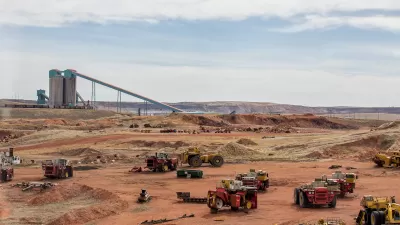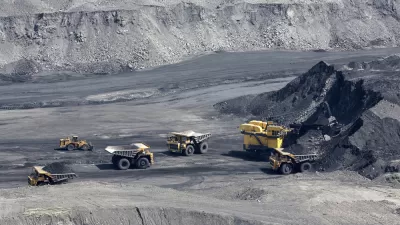Following-up on the president's assertion in his State of the Union address to better manage coal and oil resources on federal lands to account for environmental and financial costs, the administration declared a 'pause' on issuing new coal leases.
"I'm going to push to change the way we manage our oil and coal resources so that they better reflect the cost they impose on taxpayers and our planet," stated President Obama last Tuesday in his address to the nation
Readers may recall that a "moratorium" differs from an outright ban in the sense that it applies to a specific period of time. While many in the media used the term moratorium (which it is, in effect), Sally Jewell, Secretary of the Department of Interior uses the term "pause" seven times while omitting "moratorium." The 'pause' takes effect immediately in order to conduct a review of the financial and social costs associated with coal mining on federal lands as noted in her press release:
The programmatic review will examine concerns about the federal coal program that have been raised by the Government Accountability Office, the Interior Department’s Inspector General, Members of Congress and the public. The review, in the form of a Programmatic Environmental Impact Statement (PEIS), will take a careful look at issues such as how, when, and where to lease; how to account for the environmental and public health impacts of federal coal production; and how to ensure American taxpayers are earning a fair return for the use of their public resources.
"The department will consider raising the royalty rates it charges mining companies, which critics have long criticized as too low and rife with loopholes," writes Alan Neuhauser, energy, environment and STEM reporter for U.S. News & World Report. "The review, first reported Thursday evening, will take at least three years."
"Coal companies should be charged as much as five times what it costs them for surface mining on federal lands, according to a new report from a nonpartisan think tank at the New York University School of Law," wrote Neuhauser last October.
In addition to recouping financial costs, the department wants to ensure that the coal leasing costs "take into account [...] what's often called the "social costs" of coal — its impact on climate change and public health," writes Bill Chappell for NPR's "The Two Way."
Finally, NPR's "Weekend Edition Saturday" looked at the impact the pause will have on states, Wyoming in particularly as it is farway the nation's largest coal producer. "In practice, the moratorium won't have much of an immediate effect here," states Wyoming Public Radio's Stephanie Joyce.
Readers may wish to listen to the audio broadcast to appreciate the full reaction of locals to the moratorium in the Cowboy State.
It doesn't stop existing coal production. And the federal government estimates that, nationwide, the leases companies already have could supply 20 years of U.S. demand. But the review is likely to bring about changes that will make it more expensive to mine coal on federal land, and that could have a big impact on Wyoming. Coal provides a quarter of state revenues.
"In Wyoming, most of the federally-owned coal mines and revenue from coal leases pays for school construction," adds Joyce.
The moratorium is somewhat similar to broader legislation proposed last year that calls for an outright ban on new drilling for all fossil fuels, including oil and natural gas, on federal lands and waters.
"If Obama is true to his pledge in the State of the Union, expect to see changes coming in the near future to federal leasing of oil, too," adds Joyce at the end of the NPR broadcast.
Hat tip to David McCoard , Sierra Club Energy listserv.
FULL STORY: Obama Administration Hits Pause on New Coal Leases

Alabama: Trump Terminates Settlements for Black Communities Harmed By Raw Sewage
Trump deemed the landmark civil rights agreement “illegal DEI and environmental justice policy.”

Planetizen Federal Action Tracker
A weekly monitor of how Trump’s orders and actions are impacting planners and planning in America.

How Atlanta Built 7,000 Housing Units in 3 Years
The city’s comprehensive, neighborhood-focused housing strategy focuses on identifying properties and land that can be repurposed for housing and encouraging development in underserved neighborhoods.

In Both Crashes and Crime, Public Transportation is Far Safer than Driving
Contrary to popular assumptions, public transportation has far lower crash and crime rates than automobile travel. For safer communities, improve and encourage transit travel.

Report: Zoning Reforms Should Complement Nashville’s Ambitious Transit Plan
Without reform, restrictive zoning codes will limit the impact of the city’s planned transit expansion and could exclude some of the residents who depend on transit the most.

Judge Orders Release of Frozen IRA, IIJA Funding
The decision is a victory for environmental groups who charged that freezing funds for critical infrastructure and disaster response programs caused “real and irreparable harm” to communities.
Urban Design for Planners 1: Software Tools
This six-course series explores essential urban design concepts using open source software and equips planners with the tools they need to participate fully in the urban design process.
Planning for Universal Design
Learn the tools for implementing Universal Design in planning regulations.
Jessamine County Fiscal Court
Caltrans
Institute for Housing and Urban Development Studies (IHS)
City of Grandview
Harvard GSD Executive Education
Toledo-Lucas County Plan Commissions
Salt Lake City
NYU Wagner Graduate School of Public Service




























